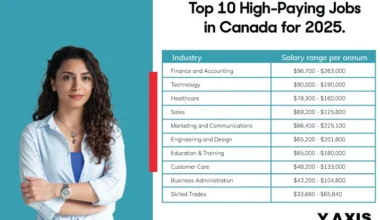Canada is a top destination for international students, offering world-class education, a welcoming environment, and excellent career opportunities. Many students aim to secure high-paying jobs to support their studies and build a prosperous future. If you’re looking for the highest paying jobs in Canada for international students, this guide will help you identify lucrative career paths that align with Google AdSense policies—ensuring valuable, original, and engaging content.
Why Choose High-Paying Jobs as an International Student?
Working while studying in Canada helps cover tuition fees, living expenses, and even gain valuable work experience. Some jobs pay exceptionally well due to high demand, specialized skills, or industry growth. Here are the best high-paying jobs for international students in Canada in 2025.
Why Become a Financial Analyst in Canada?
High Earnings: $70,000 – $130,000+ salary range
Fast Career Growth: 15% projected job growth (2023-2030)
Global Opportunities: Work in banking, tech, or government
PR Pathways: Qualifies for Express Entry & Provincial Nominees
Salary Breakdown (2025)
| Experience Level | Average Base Salary | Bonus Potential | Top Employers |
|---|---|---|---|
| Entry-Level (0-2 yrs) | $65,000 – $85,000 | $5,000-$15,000 | Banks, Accounting Firms |
| Mid-Level (3-5 yrs) | $85,000 – $110,000 | $10,000-$25,000 | Investment Firms, Tech |
| Senior (5+ yrs) | $110,000 – $150,000 | $20,000-$50,000 | Hedge Funds, Fortune 500 |
| Director Level | $150,000 – $250,000+ | 50-100% bonus | Big 5 Banks, PE Firms |
Highest Paying Sectors:
- Investment Banking ($120,000 – $250,000)
- Private Equity ($150,000 – $350,000)
- Tech Finance (FAANG companies: $100,000 – $180,000)
- Quantitative Analysis ($130,000 – $200,000)
Education Pathways
1. Bachelor’s Degree (Best Options)
- Finance, Accounting, Economics, Business Math
- Top Schools: Rotman (UofT), Ivey (Western), Smith (Queen’s), Sauder (UBC)
- Cost: $35,000 – $60,000/year (international)
2. Master’s Programs (For Career Changers)
- Master of Finance (MFin): 1-year intensive (UofT, McGill)
- MBA with Finance Focus: 2-year program (Schulich, Desautels)
3. Certifications (Boost Earnings)
- CFA (Chartered Financial Analyst): +20-30% salary bump
- CPA Canada: For accounting-focused roles
- FRM (Risk Management): For banking careers
Skills You Need
Technical Skills:
1. Financial modeling (DCF, LBO, M&A)
2. Excel (VLOOKUP, PivotTables), SQL, Python
3. Bloomberg Terminal, Capital IQ
Soft Skills:
a. Presentation & data storytelling
b. Critical thinking for investment theses
c. Networking for deal flow
Job Market Outlook
Best Cities for Finance Jobs:
- Toronto (Bay Street – Financial Hub)
- Calgary (Energy Finance)
- Montreal (Hedge Funds & Tech)
- Vancouver (Wealth Management)
Top Hiring Companies:
- Banks: RBC, TD, Scotiabank
- Investment Firms: CPPIB, Brookfield
- Tech: Shopify, Google Canada
- Accounting: Big 4 (PwC, EY, Deloitte, KPMG)
Immigration Pathways
1. Post-Graduation Work Permit (PGWP)
- 3 years for Master’s graduates
- 1-2 years for Bachelor’s
2. Permanent Residency Options
- Express Entry (FSW): CRS 470+ points
- PNP Finance Streams: Ontario, BC, Alberta
- CEC Experience: 1 year Canadian work experience
Career Progression
Year 1-3: Financial Analyst → $70k-$90k
Year 4-6: Senior Analyst → $90k-$120k
Year 7+: Finance Manager/Director → $130k-$250k+
Financial Analyst vs Accountant
| Factor | Financial Analyst | Accountant |
|---|---|---|
| Salary | Higher ($70k-$250k) | Lower ($60k-$120k) |
| Work | Forecasting, Investments | Compliance, Reporting |
| Certifications | CFA preferred | CPA required |
| Growth | Faster to VP roles | Slower progression |
Action Plan for Students
- Choose target school (Target vs Non-target matters in finance)
- Secure summer internships (Year 2 & 3 are critical)
- Network aggressively (Join CFA Society events)
- Prepare for technical interviews (Wall Street Prep courses)
Pro Tip: Start building financial models in Excel during your first year!


